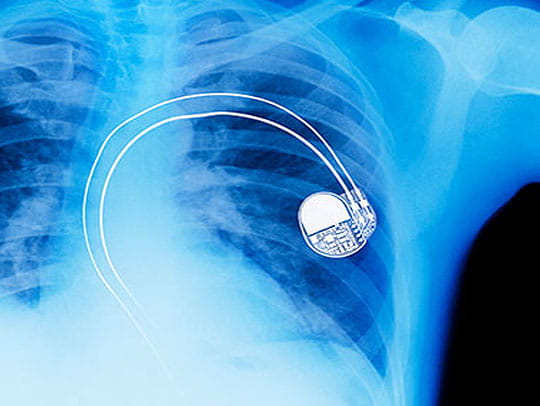
Pacemaker surgery
What is a pacemaker?1
A pacemaker is a small electronic device that’s placed under the skin on your chest, most frequently to treat an irregular heartbeat.
Skip straight to:
Public and private hospital options
It’s important to understand how getting your procedure in a public or private hospital differs.
The comparisons below are for planned procedures only, and exclude emergency surgery performed in conjunction with an emergency department admission.
| Question | Public system (Without health insurance) | Private system (With health insurance) |
|---|---|---|
| Will I avoid public hospital waiting lists? |
No. |
Yes. |
| Will I be able to choose my hospital? |
No. |
Yes. |
| Will I be able to choose my doctor or surgeon? |
No. |
Yes. |
| Will I have out-of-pocket costs? |
No. |
Yes. |
What’s covered in a public hospital?
In a public hospital, pacemaker surgery is covered by Medicare for eligible residents.
Once you are discharged from hospital, you may still need to pay out-of-pocket for things like medicines and physiotherapy.
What’s covered in a private hospital?
In a private hospital, private health insurance can cover some costs of pacemaker surgery. You may have an out-of-pocket cost if you use private hospital cover when you get treatment.
You can minimise some of these costs by choosing a hospital and specialist that have agreements with your health insurer. If you have an excess on your cover, you will have to pay for that out of pocket.
What is hospital excess?
Hospital excess is the amount of money you contribute upfront (out of your own pocket) before you can claim a benefit on hospital treatment. With HBF hospital cover, you choose a set excess option when you first get hospital cover, but you can change your excess at any time.
With HBF, you only pay hospital excess once per person, per calendar year (to a maximum of twice on a family policy) when you’re admitted to hospital.
Are you an HBF member? You can check your excess in myHBF or the HBF App. This is the set amount you’ll pay when you’re admitted.
What is an out-of-pocket cost?
A hospital out-of-pocket cost is the portion of a hospital bill that you pay from your own pocket for which you won’t be reimbursed – by either health insurance or Medicare.
How to find health cover for pacemaker surgery
If you want private health insurance cover for pacemaker surgery, look for HBF hospital cover (not extras cover) that includes a category called ‘Heart and vascular system’.
You need to hold hospital cover that includes Heart and vascular system for two months before you can claim for pacemaker surgery (or 12 months if you need pacemaker surgery due to a pre-existing condition such as coronary heart disease).
Ask your GP for an open referral
Your GP is the one who’ll most likely refer you to a specialist – but they may not recommend the specialist you’d want to perform your surgery. Asking for an open referral can let you:
- Choose your own specialist.
- Find a specialist with good availability who can perform treatment at the hospital you prefer.
- Find a specialist that you trust to perform your surgery.
- Find a specialist with minimum out-of-pocket expenses for you.
Find a cardiologist with minimum out-of-pocket costs
To find cardiologists who work with HBF, just search for ‘cardiologist’ in our find a provider tool.
- Look for the “Full Cover” tick mark or “Access Gap Cover” tick mark.
- These specialists will help minimise your out-of-pocket cost.
If you’ve already started working with a specialist
If you’ve already got a specialist, ask them these questions:
- Do you have a Full Cover or No Gap agreement with HBF?
If they don’t, you may need to consider if their fees work with your budget. - What hospital(s) do you operate in?
You can then check if the hospital has a Full Cover or No Gap agreement with HBF.

What heart conditions require a pacemaker?1
A permanent pacemaker may be recommended if you have:
- Arrhythmias (conditions where your heart beats abnormally).2
- Heart disease.
- Other conditions that affect the heart rate.
A temporary pacemaker may be recommended while your heart recovers from a heart attack, heart surgery or drug overdose.
This is a heart procedure, which can be connected to serious heart health issues like blocked coronary arteries and heart attacks. If you experience sudden chest pain, go to your nearest emergency department or call triple zero (000) immediately and ask for an ambulance.

How does pacemaker surgery work?3
Pacemaker surgery is performed in hospital and usually takes 30-60 minutes.
- You will have local anaesthetic injected just below your collarbone.
- A cut is made in this area and a wire is passed down a vein and into your heart.
- The pacemaker is attached to the wire and inserted under your skin just below your collarbone.

Recovering from pacemaker surgery3
You should be able to go home the same or the next day.
- Avoid strenuous exercise for about a week, especially exercise that uses your shoulder.
- Your cardiologist will be able to provide guidance on when you can restart exercise.
- You will continue to have ongoing check-ups, usually every 6 months.
- The battery in a pacemaker lasts between 5 and 15 years, after which time it will need to be replaced.
- Most people with pacemakers can play sport, swim and keep doing other physical activities.
You should avoid contact sports like football, and you’ll get instructions about being careful with some electrical equipment and medical procedures.
Looking for health insurance? Get a quote in minutes
Compare our hospital and extras cover options now. Or use our Health Insurance recommendation tool to select your needs and find our most affordable cover to suit.

Further reading



1 Health Direct - Pacemaker (2020)
2 Health Direct - Arrhythmias (2022)
3 Heart Foundation - Permanent Pacemaker (2021)